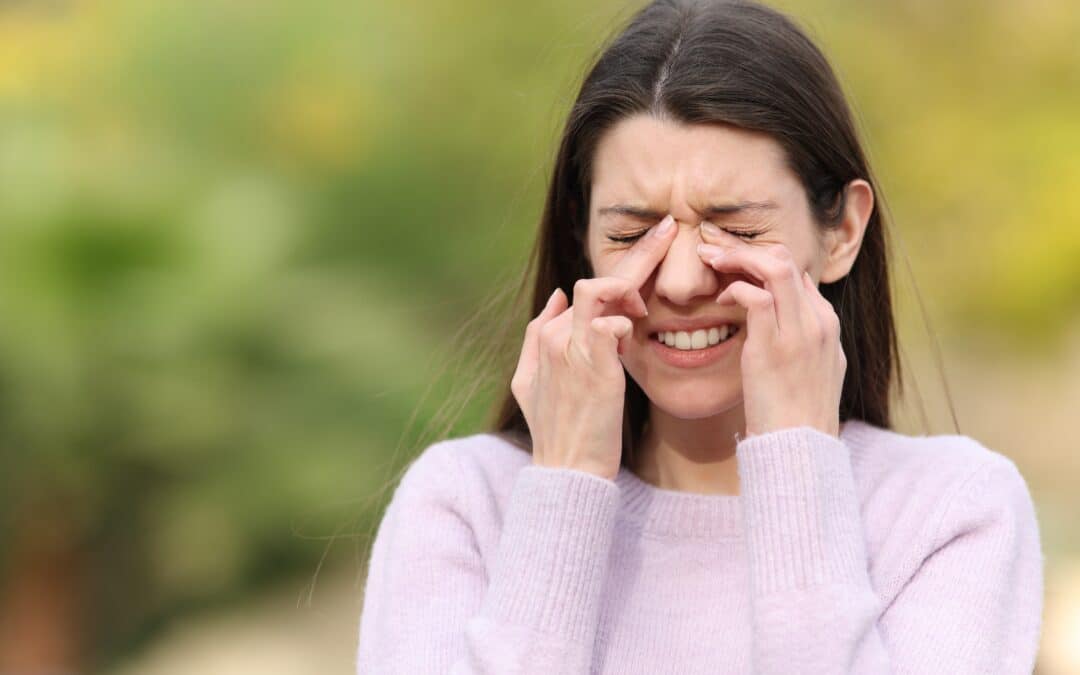Published by Jackson Davenport EyeCare Center – Summerville’s trusted optometry practice for over 50 years
Understanding Spring’s Impact on Eye Health in the Lowcountry
As spring arrives in Summerville, SC, the blooming azaleas and flowering dogwoods create a beautiful landscape throughout the Lowcountry. However, for many residents, this seasonal beauty comes with an unwelcome companion: seasonal eye allergies. At Jackson Davenport EyeCare Center, we’ve been helping families navigate spring eye health challenges for over five decades, and we understand the unique allergen patterns that affect our local community.
The humid subtropical climate of South Carolina creates ideal conditions for various allergens, including tree pollen from oak, pine, and hickory trees, which peak during March and April. These microscopic particles can trigger allergic conjunctivitis, causing symptoms that range from mild irritation to severe discomfort that interferes with daily activities.
Recognizing Spring Eye Allergy Symptoms
Many patients visiting our Summerville eye care center during spring months experience similar symptoms. Understanding these signs helps distinguish between seasonal allergies and other eye conditions that may require different treatment approaches:
Primary Allergy Symptoms:
- Red, bloodshot eyes that appear inflamed or irritated
- Intense itching that worsens with rubbing
- Excessive tearing or watery discharge
- Swollen eyelids and puffy under-eye areas
- Burning sensation or feeling of grit in the eyes
- Light sensitivity that makes outdoor activities uncomfortable
- Blurred vision due to tear film instability
When Spring Allergies Affect Vision Quality:
Seasonal allergies don’t just cause discomfort—they can temporarily impact your vision quality. The inflammatory response triggered by allergens can disrupt your natural tear film, leading to fluctuating vision throughout the day. This is particularly problematic for contact lens wearers, who may find their lenses uncomfortable or notice increased protein deposits that cloud their vision.
The Science Behind Seasonal Eye Allergies
Understanding why spring triggers eye allergies helps patients better manage their symptoms. When pollen particles come into contact with the conjunctiva (the clear membrane covering the white part of your eye), your immune system may identify them as threats. This triggers the release of histamine and other inflammatory chemicals, causing the characteristic symptoms of allergic conjunctivitis.
In the Charleston and Summerville area, we see predictable allergen patterns:
- Early spring (February-March): Tree pollens from elm, maple, and cedar
- Mid-spring (March-April): Oak, pine, and hickory tree pollens peak
- Late spring (April-May): Grass pollens begin, overlapping with late tree pollens
Professional Treatment Options for Spring Eye Allergies
Over-the-Counter Solutions:
For mild to moderate symptoms, several over-the-counter eye drops can provide relief:
- Antihistamine eye drops (such as those containing ketotifen) work quickly to reduce itching and redness
- Artificial tears help flush allergens from the eye surface and stabilize the tear film
- Decongestant eye drops can reduce redness but should only be used short-term
Prescription Treatments:
When over-the-counter options aren’t sufficient, Dr. Christopher Holstead at Jackson Davenport EyeCare may recommend:
- Prescription antihistamine drops for more severe symptoms
- Mast cell stabilizers that prevent the release of histamine
- Combination medications that address multiple aspects of the allergic response
- Corticosteroid eye drops for severe cases (used under careful supervision)
Advanced Treatment Options:
For patients with persistent or severe seasonal allergies, we may discuss:
- Allergy immunotherapy (working with local allergists)
- Specialty contact lenses designed for sensitive eyes
- Punctal plugs to help retain natural tears and medications
Comprehensive Prevention Strategies for Lowcountry Residents
Environmental Controls:
Creating an allergen-reduced environment significantly impacts symptom severity:
- Monitor local pollen counts using weather apps or websites specific to the Charleston area
- Keep windows closed during high pollen days, typically between 5-10 AM and on windy days
- Use air conditioning with HEPA filters in your home and car
- Change HVAC filters monthly during peak allergy season
- Consider air purifiers for bedrooms and main living areas
Personal Protective Measures:
- Wear wraparound sunglasses when outdoors to create a barrier against airborne allergens
- Shower before bedtime to remove pollen from hair and skin
- Wash hands frequently, especially after outdoor activities
- Change clothes after spending extended time outside
- Keep pets clean as they can carry pollen indoors on their fur
Timing Outdoor Activities:
Strategic planning of outdoor activities can minimize allergen exposure:
- Plan outdoor activities for late afternoon or evening when pollen counts are typically lower
- Avoid yard work during peak pollen hours or delegate to family members without allergies
- Exercise indoors during high pollen days, utilizing gyms or home workout options
- Choose rainy day activities as rain washes pollen from the air
Special Considerations for Contact Lens Wearers
Contact lens patients face unique challenges during allergy season. Allergens can adhere to lens surfaces, creating a constant source of irritation. At Jackson Davenport EyeCare, we work closely with contact lens wearers to modify their routine during peak allergy season:
Contact Lens Modifications:
- Switch to daily disposable lenses during peak allergy season to avoid allergen accumulation
- Reduce wearing time on high pollen days
- Use preservative-free artificial tears approved for contact lens use
- Consider specialty allergy lenses designed with smoother surfaces that resist protein deposits
- Maintain backup prescription eyeglasses for severe allergy days
Lens Care During Allergy Season:
- Increase cleaning frequency with recommended solutions
- Replace lens cases monthly to prevent allergen accumulation
- Avoid tap water contact with lenses to prevent additional irritants
- Consider protein-removing treatments for weekly or monthly lenses
Spring Eye Care for Different Age Groups
Children and Adolescents:
Young patients require special attention during allergy season, as they may not articulate their discomfort clearly. Pediatric eye care considerations include:
- Teaching proper eye hygiene to prevent symptom worsening
- Recognizing behavioral changes that may indicate eye discomfort
- Age-appropriate eye drops and application techniques
- Screen time modifications when eyes are already irritated
- School notification about allergy management needs
Older Adults:
Senior patients may experience more severe allergy symptoms due to:
- Dry eye syndrome that worsens with allergen exposure
- Medication interactions with allergy treatments
- Reduced tear production that limits natural allergen flushing
- Multiple eye conditions that complicate allergy management
The Connection Between Spring Allergies and Other Eye Conditions
Dry Eye Syndrome:
Seasonal allergies can exacerbate dry eye syndrome, creating a cycle where reduced tear production makes eyes more susceptible to allergen irritation. This is particularly common among our patients who spend significant time in air-conditioned environments or have careers requiring extensive computer use.
Conjunctivitis Types:
It’s crucial to distinguish between allergic conjunctivitis and infectious forms:
- Allergic conjunctivitis: Bilateral symptoms, itching predominates, clear discharge
- Viral conjunctivitis: May start in one eye, burning sensation, watery discharge
- Bacterial conjunctivitis: Thick, purulent discharge, morning crusting
When Allergies Mask Other Conditions:
Persistent or severe symptoms may indicate underlying conditions requiring professional evaluation:
- Meibomian gland dysfunction affecting tear quality
- Blepharitis causing chronic eyelid inflammation
- Corneal complications from severe rubbing or allergen exposure
Nutritional Support for Spring Eye Health
Supporting your eye health from within can complement external allergy management strategies. Research suggests certain nutrients may help reduce inflammatory responses and support overall eye health:
Anti-Inflammatory Nutrients:
- Omega-3 fatty acids from fish, flax seeds, and walnuts support tear film quality
- Quercetin from onions, apples, and berries acts as a natural antihistamine
- Vitamin C from citrus fruits and leafy greens supports immune function
- Lutein and zeaxanthin from dark leafy greens protect eye tissues
- Zinc from nuts and seeds supports healing and immune function
Hydration and Eye Health:
Proper hydration becomes even more critical during allergy season. Adequate water intake supports:
- Tear production and quality
- Toxin elimination through natural processes
- Mucous membrane health throughout the respiratory system
- Overall inflammatory response regulation
Technology and Spring Eye Care
Digital Eye Strain During Allergy Season:
When seasonal allergies make outdoor activities uncomfortable, many patients increase their screen time for indoor entertainment and work. This combination can worsen eye discomfort:
- Reduced blink rates while focusing on screens compound dry eye symptoms
- Blue light exposure may increase eye strain when eyes are already irritated
- Poor posture from extended device use can affect tear distribution
- Air conditioning in indoor spaces can further dry the eyes
Screen Time Management Tips:
- Follow the 20-20-20 rule: Every 20 minutes, look at something 20 feet away for 20 seconds
- Adjust screen brightness to match surrounding light levels
- Position screens slightly below eye level to promote natural tear distribution
- Use artificial tears more frequently during extended screen sessions
- Consider computer glasses with anti-reflective coatings
When to Seek Professional Eye Care
While many spring allergy symptoms can be managed with over-the-counter treatments and lifestyle modifications, certain situations warrant professional evaluation at Jackson Davenport EyeCare Center:
Immediate Attention Required:
- Severe eye pain that doesn’t respond to usual treatments
- Sudden vision changes or loss of vision
- Thick, colored discharge suggesting bacterial infection
- Light sensitivity that’s severe or worsening
- Foreign body sensation that persists after flushing
Schedule an Appointment When:
- Over-the-counter treatments aren’t providing adequate relief
- Symptoms persist beyond typical allergy season
- Contact lens intolerance develops suddenly
- Work or daily activities are significantly impacted
- Previous allergy treatments are no longer effective
Annual Eye Exams During Allergy Season:
Spring is an excellent time for comprehensive eye exams, as Dr. Holstead can evaluate how seasonal allergies affect your overall eye health and update your management plan accordingly. During these visits, we assess:
- Current prescription accuracy for glasses and contacts
- Eye surface health and tear film quality
- Allergy symptom severity and treatment effectiveness
- Overall eye health including early disease detection
Creating Your Personalized Spring Eye Care Plan
Every patient’s allergy experience is unique, influenced by genetic factors, environmental exposures, and overall health status. At Jackson Davenport EyeCare, we work with each patient to develop a personalized approach to spring eye care:
Assessment Phase:
- Symptom tracking to identify patterns and triggers
- Lifestyle evaluation including work environment and hobbies
- Previous treatment response analysis
- Overall health consideration including other medical conditions
Treatment Customization:
- Preventive measures tailored to your daily routine
- Treatment protocols matched to symptom severity
- Contact lens modifications for lens wearers
- Follow-up scheduling to monitor treatment effectiveness
Community Resources and Support
Living in the Lowcountry means being part of a community that understands seasonal allergy challenges. Jackson Davenport EyeCare Center has been serving Summerville families for over 50 years, and we’ve built strong relationships with local healthcare providers to ensure comprehensive allergy care:
Local Allergy Resources:
- Lowcountry pollen counts and forecasting services
- Allergist referrals for comprehensive allergy testing
- Environmental specialists for home and workplace assessments
- Support groups for chronic allergy sufferers
Seasonal Preparation Services:
- Pre-season consultations to update treatment plans
- Prescription refill coordination before peak allergy season
- Contact lens supply planning for daily disposable users
- Emergency appointment availability during severe allergy episodes

